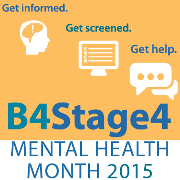Bipolar Disorder
An Opportunity to Think Upstream
Acting before Stage 4 will prevent people from ending up on the streets.
Posted May 9, 2015
May is Mental Health Month. Most people have heard about this. But it may come as a surprise that it was started back in 1949 by Mental Health America, then known as the National Mental Health Association.

I think that everyone would agree that the times have changed dramatically since 1949. Back then, our only solution to mental health crises was to put people in large state psychiatric hospitals. We didn’t have the drug therapies we have today, and we did not have community-based systems of care.
But in truth, things haven’t changed as dramatically as we would like for many people, like my son Tim, who live with serious mental illnesses. The drugs we’ve developed don’t always get to them, and the community systems of care don’t always engage them.
As a result, they’re frequently on the streets or in a different kind of custodial care institution – our county jails or state prisons.
At Mental Health America, we’ve thought a lot about how to change this reality. And we keep coming back to one thing. We need to stop waiting to act until people become so sick that lives are at stake. We need to think upstream, to a decade or more before that time.
We see this with our MHA screening program (http://www.mentalhealthamerica.net/mental-health-screening-tools). In just one year, more than 350,000 screens have been completed on our web site. More than half of those screening are under the age of 30. Two-thirds screen as positive or in the moderate-to-severe range for the conditions (depression, anxiety, bipolar disorder, PTSD) for which we have tools. And two-thirds of them say they have never been diagnosed with a mental health condition.
So this year, we’ve built Mental Health Month around this simple theme: B4Stage4. All it means is that we have to stop making mental illnesses the only chronic conditions we wait until Stage 4 to treat, and start identifying them and treating them sooner.
We’ve made a host of materials available on our web site (http://www.mentalhealthamerica.net/may) to support B4Stage4. And as of the beginning of the month, more than 3,500 organizations had embraced the message and downloaded the materials.
That’s impressive, because thinking B4Stage4 changes the equation for people like Tim. It gets us focused on what we can do early, before a crisis occurs, and even before children start losing time at school and adults start losing time at work on account of mental health concerns.
It gives us a way to talk about mental health conditions that reduces stigma, by helping us think about mental illnesses in exactly the same way we think about other chronic conditions.
And this in turn reminds us that while cures may not always be possible, recovery is, and when recovery means the opportunity to live a productive life, it is simply what everyone is entitled to expect.
Thinking and acting before Stage 4 will prevent a lot of people like Tim from ever getting onto the streets in the first place, and that’s a goal we all can share.


